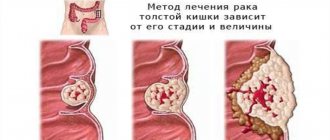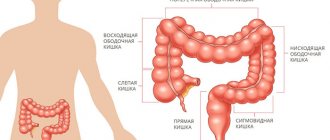- home
- Coloproctology
- Rectal cancer
- Rectal cancer stage 2
In stage 2 rectal cancer - an oncological disease - the size of the tumor originating from the cells of the colon mucosa does not exceed 5 cm. Taking into account the characteristics of the spread of cancer cells, two substages are distinguished: in stage 2A rectal cancer there are no metastases. At stage 2B, malignant cells are found in regional lymph nodes.
The disease is more often diagnosed in older patients, but in recent years there has been a trend towards an increase in the number of patients among young people. Among the common risk factors that increase the likelihood of disease: excess fat in the diet, lack of fiber, lack of exercise, chronic diseases of the colon (for example, polyps, ulcerative colitis, Crohn's disease, etc.).
Kinds
Based on histological characteristics, intestinal cancer is divided into:
- adenocarcinoma - a formation of malignantly changed glandular cells and occurs in 95% of all cases of the disease;
- lymphoma - a tumor formed from fibrous tissue of the intestinal wall;
- carcinoma - a formation consisting of epithelial cells;
- sarcoma is a malignant tumor that forms mainly on the outer wall of the intestine from connective tissue cells;
- melanoma - the basis are skin cells called melanocytes.
Tumors are classified according to the type of growth:
- exophytic - growing on the inner wall in the intestinal lumen, as a result of which obstruction of the organ gradually develops;
- endophytic – growing into the intestinal wall with subsequent formation of ulcers and a high risk of metastases upon contact with healthy tissues;
- diffuse – tumors growing to the sides from the focus without narrowing the intestinal lumen;
- mixed - having characteristics of two or three of the listed types.
What is rectal cancer
Rectal cancer
Rectal cancer is characterized by the growth of a malignant tumor in the epithelium of the final section of the intestine. This is a common type of cancer of the digestive organs, characterized by a severe course and high mortality.
This disease is often combined with a malignant tumor of the colon, since the pathologies have a common mechanism of formation.
The rectum is the final section of the intestine. Food substrates are digested in the stomach and small intestine, and in the large intestine water is absorbed and feces are formed. The rectum, ending in the anus, directly removes feces from the body.
Like other parts of the intestine, the rectum is often susceptible to inflammatory and traumatic factors that can provoke tumor growth.
Although rectal cancer and colon cancer may have a common etiology, the clinical presentation and treatment of these diseases differ. This is mainly due to the peculiarities of the anatomical location of the rectum in the limited space of the pelvic cavity.
As a result, surgical treatment of this disease is quite complex. Also, the location of the tumor largely influences the location of metastases.
Symptoms
In case of intestinal cancer, the first symptoms are manifestations of general intoxication, developing due to the growth of a malignant neoplasm and the immune response, as well as due to impaired digestive function. Among them:
- fatigue, general weakness;
- joint pain as a result of an autoimmune reaction;
- a steady increase in temperature to a little over 37 degrees;
- unexplained weight loss;
- aversion to the smell of meat or some other products;
- nausea;
- pale skin;
- flatulence, bloating, colic;
- dark stool with lots of mucus.
Subsequently, as the intestinal tumor grows, the symptoms increase and new signs appear;
- cramping abdominal pain with a frequency of 15-20 minutes;
- asymmetrical increase in abdominal volume;
- frequent vomiting due to general intoxication;
- alternating diarrhea and stool retention;
- traces of blood in the stool.
When intestinal obstruction occurs due to the tumor blocking the intestinal lumen, the intestinal wall stretches excessively, blood circulation in it is disrupted, resulting in necrosis of the deformed tissue and peritonitis.
Causes and risk factors
At the moment, there is no reliably established list of causes of intestinal cancer, but experts know factors that increase the risk of developing a malignant tumor.
- Benign neoplasms. This includes adenomas and polyps that form in the intestines, but there is no exact data on what exactly triggers the process of malignant degeneration of cells.
- Chronic inflammation. These are nonspecific ulcerative colitis, Crohn's disease, dysbiosis of various types, colon diverticulosis (formation of peculiar pockets in the intestinal wall).
- Unbalanced diet. A lack of plant fiber in combination with a large amount of highly processed meat products causes impaired peristalsis and irritation of the intestinal wall.
- Impact of external factors. Aniline dyes, carcinogenic compounds, and radioactive radiation can serve as a trigger for the malignant degeneration of cells.
Forecasts
Metastases in the intestine indicate the 4th stage of progression of the pathology. If the metastases extend beyond the intestinal confines, but do not affect other organs and lymph nodes, the probability of cure is 70%. If the situation is more serious, then a much smaller number of people survive (from 20 to 40 percent). The chances of a favorable outcome can be increased by using adjuvant therapy. If the disease was diagnosed too late (for example, at the 4th stage of progression) or serious complications occur, it is recommended to undergo a chemotherapy course. Thanks to it, it is possible to slow down the growth of an oncological focus, alleviate the present symptoms, and also significantly prolong life.
Stages
Clinical symptoms of intestinal cancer directly depend on the stage of the disease.
- The tumor develops within the epithelium and does not penetrate other tissues; there are no metastases. Clinical manifestations are absent or so insignificant that they do not attract the patient’s attention. Diseases are discovered accidentally during histological examination of removed polyps.
- A malignant neoplasm grows into the submucosal or muscular layer without affecting adjacent lymph nodes. The disease may manifest itself in the form of initial general symptoms.
- The tumor grows through the entire intestinal wall and can affect neighboring organs. Metastases are present in regional lymph nodes. Severe symptoms include general malaise and intestinal dysfunction.
- The malignant node gives multiple metastases to distant organs. The patient experiences constant abdominal pain, intestinal bleeding, and severe intoxication with tissue breakdown products.
Features of the metastatic process in intestinal cancer
It is necessary to take into account the fact that the lymph nodes are responsible for the normal functioning of human natural resistance. When metastasis begins, they lose their original properties and begin to become inflamed. As a result, oncological components are easily transferred to other organs.
The liver is responsible for filtering organic blood. Penetrating inside this organ, metastases are localized in it, turning into a secondary cancer focus. When this happens, the person may suffer from severe pain. After oncological components penetrate the liver, its functioning is severely impaired. The liver stops filtering the blood normally, which leads to a gradual accumulation of toxins.
The lungs are an organ densely filled with blood vessels. In addition, there are lymph nodes that play the role of a kind of drainage system. After penetration into the lungs of the metastatic formation, its further progression is asymptomatic. Because of this fact, pulmonary metastases are detected very late, which has a detrimental effect on the effectiveness of treatment.
Diagnostics
The main difficulty in diagnosing intestinal cancer is the patient’s failure to see a doctor in a timely manner.
In the early stages, clinical manifestations are mild, which makes it difficult to make a primary diagnosis.
To identify a tumor, a number of tests are prescribed.
- General and biochemical blood tests. The level of hemoglobin, the number of red and white blood cells, the level of bilirubin, the presence of tumor markers, etc. are examined.
- Colonoscopy. Using a special probe inserted into the anus, an oncologist or gastroenterologist examines the large intestine for the presence of tumors and ulcerative defects. If suspicious areas are detected, a biopsy is performed followed by histological examination of the tissue.
- Irrigoscopy. X-ray contrast examination of the large intestine reveals deformed areas, tumors, compactions and other structural abnormalities.
- Ultrasound of the abdominal cavity. The study makes it possible to clarify the size of the tumor, detect germination into other organs and metastases in the lymph nodes, liver, mesentery, and other organs.
- CT scan of the abdomen. The most accurate and informative study allows you to estimate the size of the tumor, determine the stage of cancer, germination into organs, and the presence of metastases.
Description of radiofrequency ablation
With this approach, “local heating” of the cancer focus is carried out, causing the death of cancer cells. Under ultrasound guidance, a thin electrode is inserted into the lesion. At the end of this electrode there is a special current, which, using radio waves, heats the source (the source is heated to 100 degrees). The electrode is inserted subcutaneously or through laparoscopy. Postoperative administration is also possible. Often during surgery, eliminating the maternal lesion and large metastatic formations, the RFA technique is used, which destroys the remaining oncological components. RFA is introduced through the skin, cauterizes the pathogenic focus with dimensions of up to 4 cm. This procedure takes about 20 minutes.
Treatment
The choice of treatment for bowel cancer depends on the stage of the disease.
- At the zero stage, i.e. If polyps are detected, they are removed using colonoscopy, without opening the abdominal cavity
- At the first stage, the segment of intestine with the tumor and part of the mesentery are surgically removed.
- In the second stage, chemotherapy is given before surgery to shrink the tumor. After surgery, the remaining cells are destroyed using chemotherapy or radiation therapy.
- For stage three colon cancer, surgical treatment is performed in combination with chemotherapy or radiation therapy. Areas affected by cancer and regional lymph nodes are removed.
- At the fourth stage, the nature of the operation depends on the degree of spread of malignant tumors. If it is impossible to remove the tumor, palliative treatment is performed to exclude intestinal obstruction.
Invasive method of metastasis
Another way for metastases to spread is tumor growth into the abdominal cavity. It gradually increases in size. In later stages, the tumor spreads from the intestine to the peritoneum. Fragments of the tumor break off and spread to other organs.
The invasive method of metastasis leads to the development of peritoneal carcinomatosis - secondary involvement in the cancer process of the membrane lining the inner surface of the abdominal cavity and the surface of the internal organs. The peritoneum can also be affected by the spread of atypical cells through its blood and lymphatic vessels. At stage 1 of the process, doctors detect no more than 1-2 nodes measuring up to 5 mm. At stage 2, multiple malignant foci appear on the peritoneum, and at stage 3 they merge and cover most of the surface of the peritoneum.
Detection of peritoneal carcinomatosis requires correction of the treatment protocol, in particular, the HIPEC procedure, which we will consider below.
Send a request for treatment
Rehabilitation
In the first few days after surgery, the patient is given intravenous nutrition. In the future, it is necessary to adhere to special nutritional principles, consuming only liquid and pureed foods. A special diet for intestinal cancer is prescribed taking into account the individual characteristics of the body, but the menu must include liquid dishes, fresh and boiled vegetables and fruits. In addition, during the recovery period it is necessary to avoid physical and psychological stress, regularly visit a doctor, and take prescribed tests.










